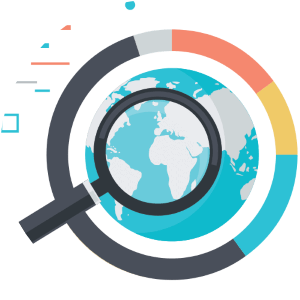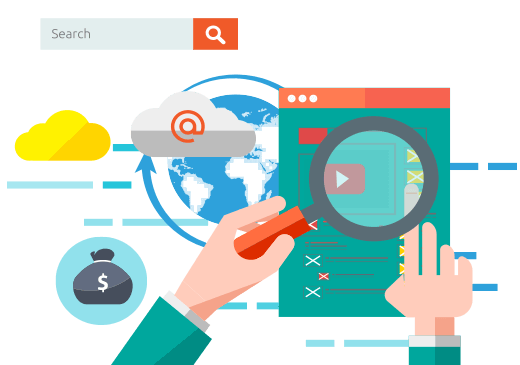Business Intelligence is a tool that companies use in their data analysis process. Find out the techniques and benefits.
What is Business Intelligence?
Business Intelligence (BI) is a set of instruments and techniques to collect, analyze, and present data to gain insight into business operations.
BI can help discover trends, prevent reputational risk, identify opportunities forimprovement, and optimize processes.
Companies can extract valuable insights from their data using BI technologies, such as data storage, predictive analytics, machine learning algorithms, and visualization tools.
Business Intelligence is an essential tool for organizations that want to stay ahead of the competition in today’s ever-changing business landscape.
According to the American Technology Corporation, IBM, Business Intelligence is:
‘Software that ingests business data and presents it in user-friendly views such as reports, dashboards, charts, and graphs. BI tools enable business users to access different types of data – historical and current, third-party and in-house, as well as semi-structured data and unstructured data like social media.’
What is the function of business intelligence?
It allows enterprises to understand their customers better, make better-informed decisions, and increase operational efficiency.
BI can be used to monitor customer behavior, identify areas for improvement, or measure performance against competitors.
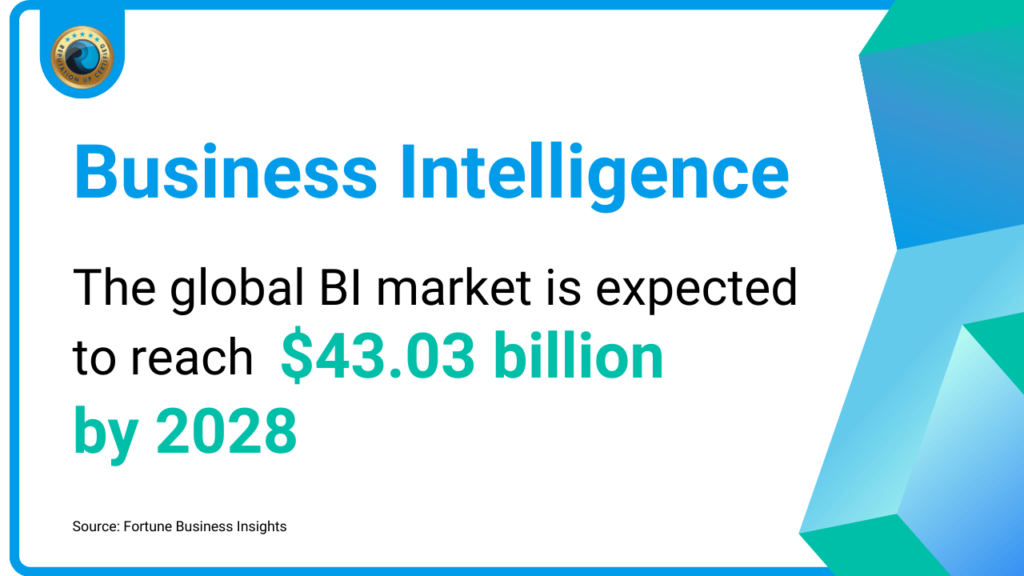
According to Fortune Business Insights, the global BI market is expected to reach $43.03 billion by 2028.
How does the Business Intelligence process work?
Business Intelligence consists of the following steps:
- Data mining:
The information is extracted using company statistics and machine learning software, which helps determine trends or patterns from a great deal of data.
- Data reporting:
It entails analyzing the data and sharing it through reports. Stakeholders and CEOs gather valuable information that can be used early on.
- Benchmarking and metrics:
The new data is compared with past data to determine whether the targets were met and specific benchmarks were encountered.
- Descriptive analytics:
Initial information obtained from data analysis is used to generate descriptive analytics.
- Queries for data analysis:
Developing question answering on data extraction.
- Statistical analysis:
The results generated from the descriptive analysis are used to create statistics. After the applied statistics, the patterns of trends, origin, and reasons are deduced at this stage.
- Data visualization:
The extracted data is converted into visual elements like graphs, charts, histograms, and tables.
- Visual analysis:
Data is thoroughly analyzed using visual forms and narratives.
- Data preparation:
The different data types are used to obtain metrics and other accurate insights for data analysis.
The different data types are used to obtain metrics and other accurate insights for data analysis.
It can assist businesses in making better decisions and optimizing their processes.
It provides information regarding customer behavior, market trends, or organizational performance.
Organizations can also use it to monitor financial performance, analyze customer data, and uncover hidden patterns in data.
According to SaaS/B2B software platform FinancesOnline, 50% of companies already use Business Intelligence tools.
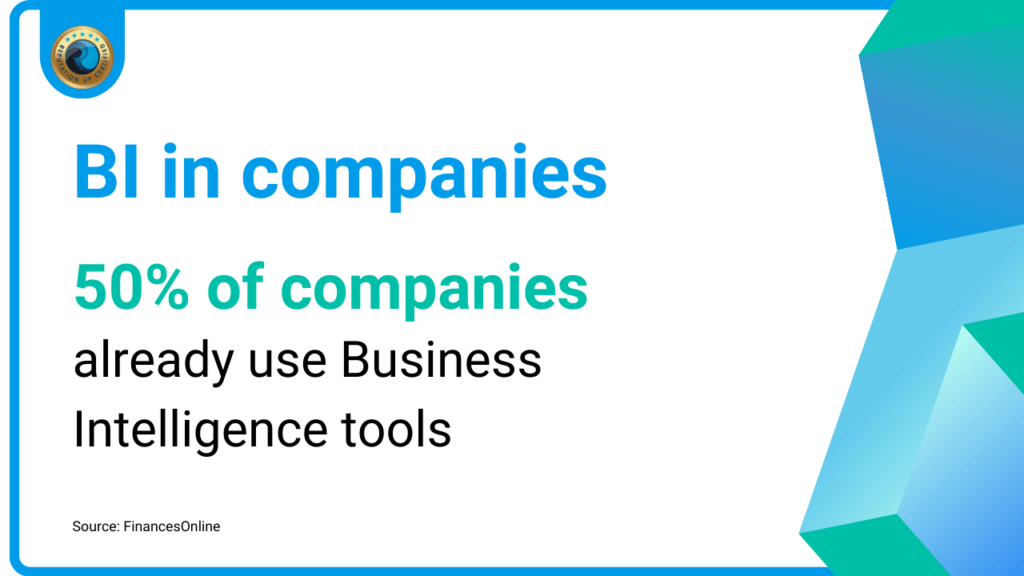
How to leverage Business Intelligence to improve decision-making?
It enables data collection, analysis, and interpretation from various sources to gain insight into business operations and performance.
BI assists organizations in identifying trends, opportunities, and challenges throughout their data.
They can use them to discover correlations between multiple variables, which can be used to build predictive models and make better decisions.
Furthermore, BI tools provide data visualizations that allow staff rapidly comprehend complex information.
It helps them quickly respond to changing market conditions and optimize their strategies. According to Deloitte, companies with CEOs who make data-driven decisions are 77% more likely to succeed.
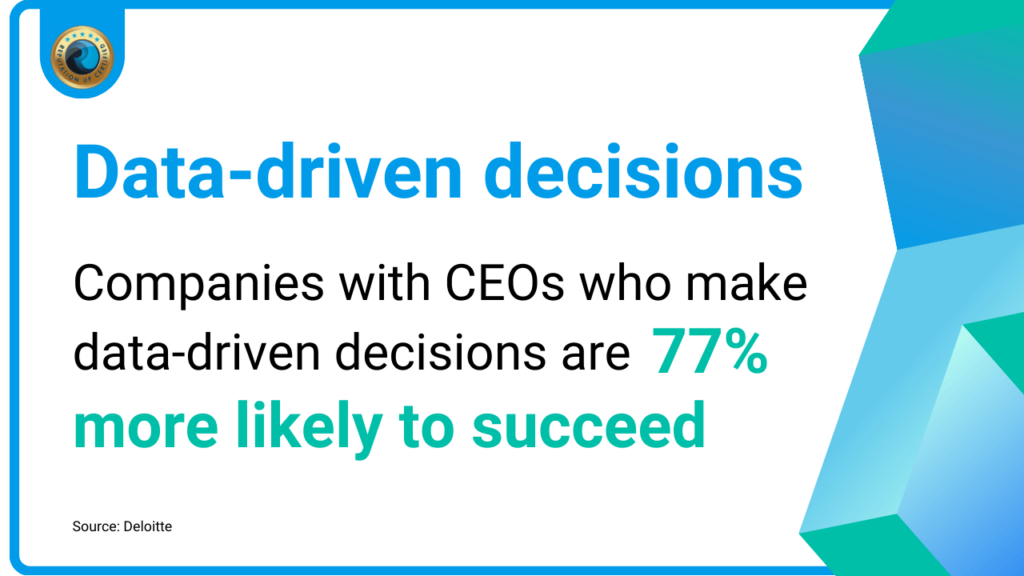
How to create a Business Intelligence strategy?
A successful Business Intelligence strategy requires thorough planning and execution.
That implies understanding the company’s needs, identifying fair data sources and tools, and creating an effective implementation plan.
In the following sections, it is explained in detail.
Set your vision and goals
Setting goals is a crucial step in developing a successful strategy.
It helps define the organization’s goals and guides how to achieve them.
They must be consistent with the organization’s mission and overall vision.
Organize your data
You should consider the BI’s ability to process big data and deliver real-time performance metrics that all stakeholders can easily understand:
- Reporting: Not all data is relevant to the current strategy.
Defining each report’s metrics, analyses, and performance indicators is critical.
Establishing the data source for each report is also crucial, mainly if the company covers multiple industries;
- Determine the industry KPIs: To understand where your company stands in the competition and the market, you must understand the niche’s key performance indicators.
ROI, profit margins, online reputation, and sales are some examples.
When the BI system is ready for launch, KPIs can be used to determine market position;
- Understand your KPIs and historical data: The only way to know if you are progressing is to regularly monitor your operations and stick to the KPIs that determine your success.
Ascertain that your database structure is well-established to store historical data and access it when necessary.
Data classification is critical to a good BI strategy.
Involve stakeholders
When setting goals, it is essential to consider all stakeholders and ensure everyone agrees on the strategy.
It aids in ensuring that it meets the needs and expectations.
It also enables better collaboration among all parties involved, resulting in more effective strategies with a higher likelihood of success.
Rely on specialists
Strategic decisions are often complex and require careful consideration of several factors.
Knowing when to use outside experts in a strategy is therefore crucial.
They can provide valuable market, competition, brand protection, and customer needs insights to help shape your strategy.
They can also assist in locating potential opportunities for growth and innovation that you may have yet to consider.
Outer specialists can provide professional advice to help you implement an effective and efficient strategy.
Finally, relying on outside specialists will ensure your decisions align with your overall goals.
Contact ReputationUP, a leading online reputation company.
Its experts cover several areas of Intelligence: risk analysis, World Check, financial reputation, cyber security, protect yourself from sextortion, and control room.
Do you want to check your partner’s financial reputation?
ReputationUP analyzes your partner’s financial reputation and sends you a detailed report
Assess your current situation
To assess the current situation, you can take the following steps:
- Understand data sources: Most companies collect their data from various sources, such as their customer relationship management (CRM) system, website, email marketing, mobile app, and analytics;
- Create a database: store all the critical data for your business.
It can be configured in-house or with the developers provided by your BI solution provider;
- Management software: it classifies data to prioritize the most relevant ones so that different parts of the company can handle the data correctly and quickly;
- Documentation: record and document each step of the BI process.
It is significant, especially for businesses that highly value ISO certifications.
Challenges that companies face when implementing Business Intelligence strategies
When adopting Business Intelligence strategies, companies must overcome many challenges that may compromise their effectiveness, corporate reputation, and success.
Data integration is a needed strategy even though analyzing and using data in decision-making is challenging because it is spread across multiple systems and platforms.
Employees require more training and technical knowledge to limit the potential of BI tools and their impact on the company.
Gartner, a research and consulting firm, predicts that by 2023, 33% of large companies will have Decision Intelligence analysts.
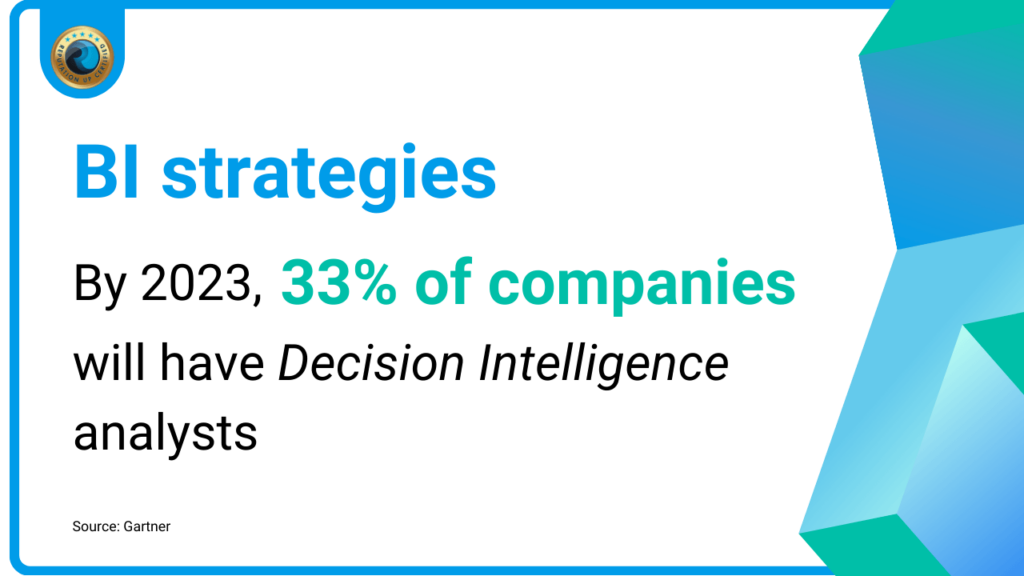
Maintaining cyber threat intelligence and privacy is also tricky, especially in an increasingly cyber environment.
Finally, businesses must adapt to constant technological and market changes.
Despite these challenges, companies can overcome risk intelligence with careful planning and practical strategies to maximize data value and improve operations.
Benefits and advantages of investing in Business Intelligence software solutions
Investing in Business Intelligence software solutions can provide numerous benefits to a company, including:
- Smarter decision-making by leveraging the potential of predictive analytics;
- Analysis of your company’s operations with dashboards and visualization tools;
- Faster and more efficient data collection;
- New business opportunities and improvements in operational efficiency through patterns and trends in data;
- Real-time reputation monitoring and taking corrective action;
- Improved communication and collaboration between company departments.
Do you want to spy on your competitors and their strategies?
Access the RepUP Monitoring Tool platform and find out how to beat the competition.
In short, investing in Business Intelligence software can boost efficiency, improve decision-making and provide a competitive advantage to your company.
Business Intelligence tools and techniques
Interactive dashboards, data analytics, data mining, artificial intelligence, and machine learning are some available tools and techniques.
Each tool and technique has benefits and drawbacks; thus, selecting the best depends on the company’s needs.
Some popular tools include Tableau, Power BI, QlikView, and SAP Lumira, while techniques such as clustering analysis and linear regression are widely used in the industry.
Choosing the right Business Intelligence tools and techniques allows companies to understand better their operations to drive growth and profitability.
According to the software company Wiiisdom, organizations use an average of 3.8 Business Intelligence tools.
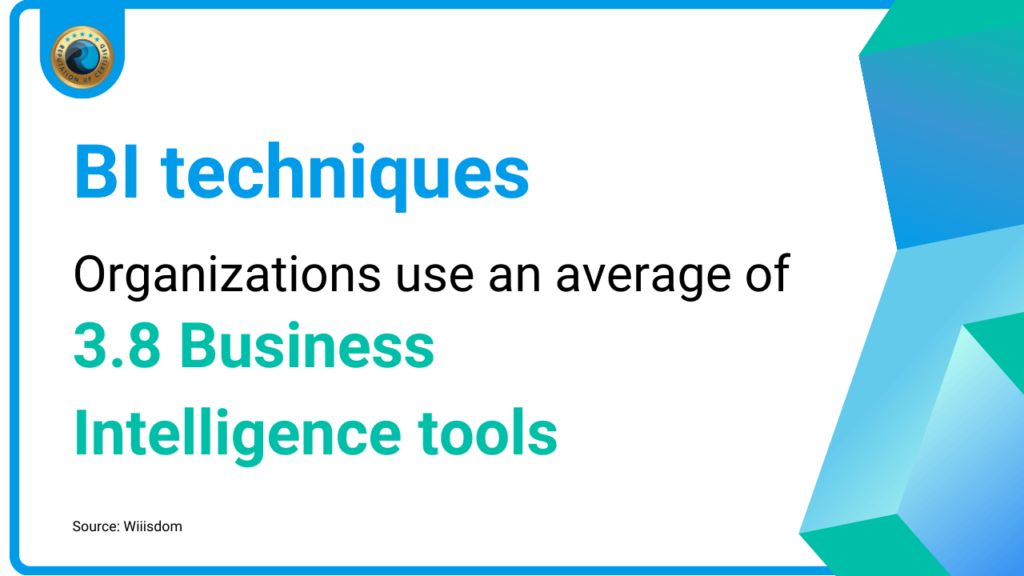
How to select the best BI platform for your company’s requirements?
Choosing the right BI platform is essential to ensuring your company’s needs are met, and the best results are obtained.
Consider several factors when selecting the right platform, including the company size, data complexity, budget, and specific information needs.
Pick a good platform that is easy to integrate with existing systems and data.
Also, consider the scalability and flexibility of the platform as the business develops to meet its changing requirements.
It would be best to test several platforms and thoroughly evaluate them before making a final decision.
Examples of Business Intelligence
Business Intelligence is widely used in various industries and applications to convert data into valuable insights and improve decision-making.
Here are some examples of how BI can be used:
- Sales analytics: companies can use BI to analyze their sales and track market trends, identify growth opportunities and optimize their marketing and neuromarketing strategies;
- Operations optimization: by analyzing the efficiency of operations and identifying areas that need to be improved to increase productivity and reduce costs;
- Customer satisfaction analysis: Companies can use BI to collect and analyze customer satisfaction data and use that information to improve their products and services;
- Financial analysis: Businesses can also use BI to analyze company finances and track economic trends and profitability.
By implementing BI properly, organizations can make the most of their data.
Why is Business Intelligence important?
By using BI techniques and tools, companies can convert data into valuable insights and use that information to:
- Identify growth opportunities: BI helps companies analyze their data and identify areas where they can invest and find new opportunities;
- Improve efficiency: With BI, businesses can monitor their operations and identify areas that require improvements to increase efficiency and reduce costs;
- Increase customer satisfaction: BI allows companies to collect and analyze data on customer satisfaction to improve their services;
- Decision-making: BI provides a more precise and detailed data view for making a clear and firm decision.
Business Intelligence is essential to help companies reach their full potential and stay competitive in a changing market.
The future role of Business Intelligence
Business Intelligence has a bright future and is expected to play an increasing role in business decision-making.
With the continuous evolution of technology and the increasing amount of data being produced, BI will continue improving and providing new business opportunities.
Future developments include the following:
- Artificial Intelligence and machine learning: integration into BI to further improve the accuracy and efficiency of analytics;
- Real-time analytics: the BI of the future will enable real-time monitoring and data analytics to make faster and more accurate decisions;
- Increasing accessibility: BI is expected to become more accessible to a wide variety of users and departments, enabling companies to extricate more valuable information;
- System integration: BI will increasingly integrate with other technologies, such as Big Data, to provide a more complete and detailed data visualization.
The future of Business Intelligence is very bright and will offer companies new ways to get value from their data.
With the continuous evolution of technology, adapting and adopting the latest trends in BI to remain competitive is crucial for companies.
Conclusions
This article introduced you to Business Intelligence, its techniques, and its benefits for companies.
From this text, you can draw the following conclusions:
- BI is based on collecting, analyzing, and presenting data to obtain information about operations;
- Organizations can also use it to monitor financial performance, analyze customer data, and uncover hidden patterns in the data;
- Creating a successful Business Intelligence strategy requires careful planning and execution;
- The strategy begins with a vision and objectives until the final assessment;
- Companies face numerous challenges, such as lack of training or technical knowledge;
- However, companies can benefit from numerous advantages, such as discovering new opportunities;
- Various tools and techniques are available, including interactive dashboards, data analytics, data mining, artificial intelligence, and machine learning techniques;
- Choosing the right BI platform ensures your company meets its needs and obtains the best results.
The future of Business Intelligence is promising and likely to play an increasingly important role in business decision-making.
If you need advice or a specific strategy in the Intelligence field, contact ReputationUP, a leading online reputation company.
FAQ
Sales and marketing departments can use it, as well as finance, supply chain, human resources, operations, and teams in charge of production efficiency and product quality.
A Business Intelligence developer is responsible for designing, implementing, and maintaining BI solutions that enable companies to analyze and visualize their data efficiently.
A Business Intelligence analyst collects and analyzes business data to provide valuable information that supports informed decision-making.
It helps informed decision-making, improvement of efficiency and profitability, identification of trends, higher customer satisfaction, and more remarkable competitiveness.

